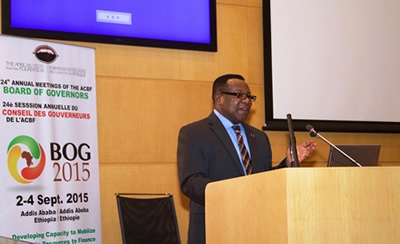
The African Capacity Building Foundation’s Executive Secretary, Prof. Emmanuel Nnadozie on Wednesday called for African countries to continue giving their voices and full political support to ACBF in its goal of building capacity on the continent.
In his introductory remarks, delivered at the opening of the Foundation’s 24th Annual Meetings held in Addis Ababa, Ethiopia (2-4 September), Prof. Nnadozie said that it was crucial for African member countries to continue increasing ownership in the Foundation by meeting their financial commitments and to ensure that the Foundation keeps on tackling capacity challenges on the continent in a sustainable manner.
Africa has recently recorded good levels of economic growth and the forecast for much of African countries remains very encouraging, Prof. Nnadozie added. “However, it is up to Africa and its leaders to seize and benefit from this window of opportunity. We need to strengthen and retrain the capacities to make this scenario prevail.”
Echoing the ACBF chief was H.E. Alemayehu Gujo, Ethiopian State Minister for Ministry of Finance and Economic Development who said in his welcoming remarks that over the years, ACBF had contributed to position capacity building at the center of the debate on Africa’s structural transformation and sustainable development. “For so long, we have seen the neglect of the nexus between capacity development and institutional levels. This needs to be urgently corrected,” H.E. Gujo said.
Calling for renewed support for the Foundation, he added that member countries should take advantage of the assistance ACBF can offer. “ACBF can offer high-level expertise in project design and structuring, which individual governments may not have and capacity needs assessments to help reduce risks in projects, making interventions by governments bankable.”
In his keynote remarks, which was read by a representative, Jennifer Chiriga, Hon. Erastus Mwencha, Deputy Chairperson of the African Union Commission (AUC) said that the work done by ACBF over the last 24 years in the fields of policy formulation and implementation had laid the ground for decisive economic policy management in many African countries and regional economic communities.
He added that the AU had over those years benefited from ACBF’s institutional and knowledge support and that, as the AUC moves towards the implementation of Agenda 2063, the role of ACBF in ensuring that the continental vision becomes reality will be crucial. “There exists a strong link between the success of Agenda 2063 and the enhancement of capacity on the continent. All the seven aspirations outlined in Agenda 2063 require substantive investment in capacity building.”
Hon. Mwencha also called for renewed support to the Foundation’s work. “As decisions makers in government you have the power to provide ACBF with both the financial resources through contributions and the continental support it requires to continue doing the work it has done over the last 24 years.”
In his remarks, Chair of the Executive Board, Prof. Callisto Madavho said that it was important for ACBF to start its new strategy for the period 2017-2021 on a sound financial basis. The contributions of African member countries are in this regard extremely important. “I want to thank our member countries for their continued financial support.”
Dr. Adeyemi Dipeolu, Director of the Capacity Development Division at the Economic Commission for Africa said that capacity development remained the cross cutting element in all development programs being implemented in Africa. “ECA and the ACBF are working together to bring coherence to various programs whose implementation depends on building capacity.”
Hon. Marcellin Agaya, Deputy Minister, representing the Gabonese Minister of Budget and Plan and Chair of the Board of Governors, Hon. Christian Magnagna reiterated the importance of political and financial support for the sustainability of the Foundation. He also called for the government of Sweden and the African Development Bank to meet their financial commitments to ACBF.





